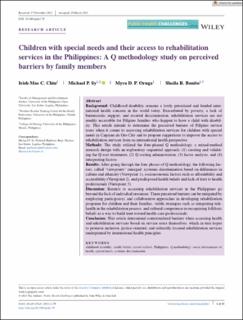Bitte benutzen Sie diese Kennung, um auf die Ressource zu verweisen:
https://doi.org/10.21256/zhaw-29920| Publikationstyp: | Beitrag in wissenschaftlicher Zeitschrift |
| Art der Begutachtung: | Peer review (Publikation) |
| Titel: | Children with special needs and their access to rehabilitation services in the Philippines : a Q methodology study on perceived barriers by family members |
| Autor/-in: | Chiu, Irish Mae C. Sy, Michael P. Oruga, Myra D. P. Bonito, Sheila R. |
| et. al: | No |
| DOI: | 10.1002/puh2.79 10.21256/zhaw-29920 |
| Erschienen in: | Public Health Challenges |
| Band(Heft): | 2 |
| Heft: | 2 |
| Seite(n): | e79 |
| Erscheinungsdatum: | 4-Apr-2023 |
| Verlag / Hrsg. Institution: | Wiley |
| ISSN: | 2769-2450 |
| Sprache: | Englisch |
| Schlagwörter: | Childhood disability; Health beliefs; Mixed method; Philippines; Q-methodology; Social determinants of health; Special needs; Systemic discrimination |
| Fachgebiet (DDC): | 614: Public Health und Gesundheitsförderung 618.92: Pädiatrie |
| Zusammenfassung: | Background: Childhood disability remains a lowly prioritized and funded international health concern in the world today. Exacerbated by poverty, a lack of bureaucratic support, and societal discrimination, rehabilitation services are not readily accessible for Filipino families who happen to have a child with disability. This article intends to determine the perceived barriers of Filipino service users when it comes to accessing rehabilitation services for children with special needs in Cagayan de Oro City and to propose suggestions to improve the access to rehabilitation services from an international health perspective. Methods: The study utilized the four-phased Q methodology, a mixed-method research design with an exploratory sequential approach: (1) creating and validating the Q-sort statements, (2) Q-sorting administration, (3) factor analysis, and (4) interpreting factors. Results: After going through the four phases of Q methodology, the following factors, called “viewpoints” emerged: systemic discrimination based on differences in culture and ethnicity (Viewpoint 1), socioeconomic factors such as affordability and accessibility (Viewpoint 2), and predisposed health beliefs and lack of trust to health professionals (Viewpoint 3). Discussion: Barriers to accessing rehabilitation services in the Philippines go beyond the lack of individual resources. These perceived barriers can be mitigated by employing participatory and collaborative approaches in developing rehabilitation programs for children and their families, viable strategies such as integrating telehealth in the rehabilitation process, and cultural competence in recognizing folkloric beliefs as a way to build trust toward health-care professionals. Conclusion: This article determined contextualized barriers when accessing health and rehabilitation services based on service users themselves, which in turn hopes to promote inclusive, justice-oriented, and culturally focused rehabilitation services underpinned by international health principles. |
| URI: | https://digitalcollection.zhaw.ch/handle/11475/29920 |
| Volltext Version: | Publizierte Version |
| Lizenz (gemäss Verlagsvertrag): | CC BY 4.0: Namensnennung 4.0 International |
| Departement: | Gesundheit |
| Organisationseinheit: | Institut für Ergotherapie (IER) |
| Enthalten in den Sammlungen: | Publikationen Gesundheit |
Dateien zu dieser Ressource:
| Datei | Beschreibung | Größe | Format | |
|---|---|---|---|---|
| 2023_Chiu-etal_Special-needs-children-access-to-rehabilitation-services-Philippines.pdf | 283.79 kB | Adobe PDF |  Öffnen/Anzeigen |
Zur Langanzeige
Chiu, I. M. C., Sy, M. P., Oruga, M. D. P., & Bonito, S. R. (2023). Children with special needs and their access to rehabilitation services in the Philippines : a Q methodology study on perceived barriers by family members. Public Health Challenges, 2(2), e79. https://doi.org/10.1002/puh2.79
Chiu, I.M.C. et al. (2023) ‘Children with special needs and their access to rehabilitation services in the Philippines : a Q methodology study on perceived barriers by family members’, Public Health Challenges, 2(2), p. e79. Available at: https://doi.org/10.1002/puh2.79.
I. M. C. Chiu, M. P. Sy, M. D. P. Oruga, and S. R. Bonito, “Children with special needs and their access to rehabilitation services in the Philippines : a Q methodology study on perceived barriers by family members,” Public Health Challenges, vol. 2, no. 2, p. e79, Apr. 2023, doi: 10.1002/puh2.79.
CHIU, Irish Mae C., Michael P. SY, Myra D. P. ORUGA und Sheila R. BONITO, 2023. Children with special needs and their access to rehabilitation services in the Philippines : a Q methodology study on perceived barriers by family members. Public Health Challenges. 4 April 2023. Bd. 2, Nr. 2, S. e79. DOI 10.1002/puh2.79
Chiu, Irish Mae C., Michael P. Sy, Myra D. P. Oruga, and Sheila R. Bonito. 2023. “Children with Special Needs and Their Access to Rehabilitation Services in the Philippines : A Q Methodology Study on Perceived Barriers by Family Members.” Public Health Challenges 2 (2): e79. https://doi.org/10.1002/puh2.79.
Chiu, Irish Mae C., et al. “Children with Special Needs and Their Access to Rehabilitation Services in the Philippines : A Q Methodology Study on Perceived Barriers by Family Members.” Public Health Challenges, vol. 2, no. 2, Apr. 2023, p. e79, https://doi.org/10.1002/puh2.79.
Alle Ressourcen in diesem Repository sind urheberrechtlich geschützt, soweit nicht anderweitig angezeigt.